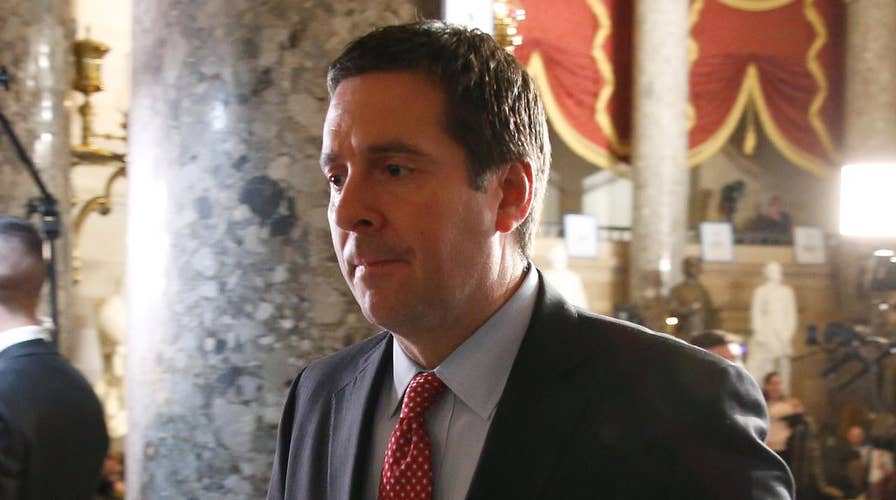First excerpts of GOP's FISA memo released
Highlights include testimony from high-ranking government official that without the anti-Trump dossier FBI and DOJ would not have secured surveillance warrant.
It may be the most powerful court you have never heard of -- operating out of a bunker-like complex just blocks from the U.S. Capitol and White House, sealed tightly to prevent any eavesdropping.
The Foreign Intelligence Surveillance Court deals with some of the most sensitive matters of national security -- terror threats and espionage. Its work for the most part cannot be examined by the American public, by order of the Congress and the President. It is a tribunal that is completely secret (or supposed to be), its structure largely one-sided, and its members unilaterally chosen by one person.
A rotating panel of federal judges at the FISC decides whether to grant certain types of government requests -- wiretapping, data analysis, and other monitoring for "foreign intelligence purposes" of suspected terrorists and spies operating in the United States.
Members of Congress worry the FISC -- at the unilateral urging of current and past administrations-- is interpreting the surveillance law way too broadly, something lawmakers say they did not intend.
The FISC court was created in 1978, part of a congressional overhaul to ensure broader oversight into the use of warrants for certain national security operations. It is made up of 11 judges who sit for seven-year terms. All are sitting federal district court judges who agree to take on the additional FISC duties and it is a rotating bench.
Typically that means one in every 11 weeks, if you are one of the judges, you come to Washington and sit for a week. It's just a single judge and the most typical thing that they do is hear applications from the government for surveillance on targets that are related to national security or foreign intelligence information.
The courtroom -- and government sources say it is a courtroom complete with a judge's bench, tables for lawyers, and support staff -- is in a windowless, secure area of the U.S. District Court on Constitution Avenue. Besides the courtroom, there is nearby office space and chambers for the visiting judges.
Exactly where in the building it is located, officials will not say. Even getting a picture of the empty courtroom is a no-go.
In another unusual twist, the 11 judges are appointed exclusively by the Chief Justice of the United States, without any supplemental confirmation from the other two branches of government. John Roberts has named every member of the current court, as a well as a separate three-judge panel to hear appeals of FISC orders, known as the Court of Review.
The Supreme Court would theoretically have the power to hear any subsequent challenges, but the justices never have-- at least not that we know. But the Electronic Privacy Information Center last week directly asked the high court to review the NSA collection of telephone communication data.
Roberts himself expressed some reservations about this judicial concept -- also known by the acronym FISA -- during his 2005 confirmation, one of the few times a federal judge has talked publicly about that court.
"I'll be very candid. When I first learned about the FISA court, I was surprised," he told senators. "It's not what we usually think of when we think of a court. We think of a place where we can go, we can watch, the lawyers argue, and it's subject to the glare of publicity. And the judges explain their decision to the public and they can examine them. That's what we think of as a court."
Because it an "ex-parte" body -- hearing only the government's side -- it has been criticized as a kangaroo court that too easily accedes to any government request.
In order to collect the information, the government has to demonstrate to the judge that it is "relevant" to an international terrorism investigation.
But the original Foreign Intelligence Surveillance Act lays out exactly what the special court must decide when it comes to public scrutiny:
"A judge considering a petition to modify or set aside a nondisclosure order may grant such petition only if the judge finds that there is no reason to believe that disclosure may endanger the national security of the United States, interfere with a criminal, counterterrorism, or counterintelligence investigation, interfere with diplomatic relations, or endanger the life or physical safety of any person."
Revisions in the law in 2008 give the attorney general and the director of national intelligence greater authority to order "mass acquisition" of electronic traffic, if it is related to a terror or espionage investigation. The administration says amassing a telecom's entire phone records database is relevant to counterterrorism, and something a FISC judge can authorize.
The law previously required the government to justify a national security interest before any monitoring of phone calls and e-mails originating in another country. That has morphed to allow metadata collection of electronic communications of Americans. Privacy advocates say the courts in a sense have had their authority dictated by congressional and executive decree, with little judicial resistance.
























